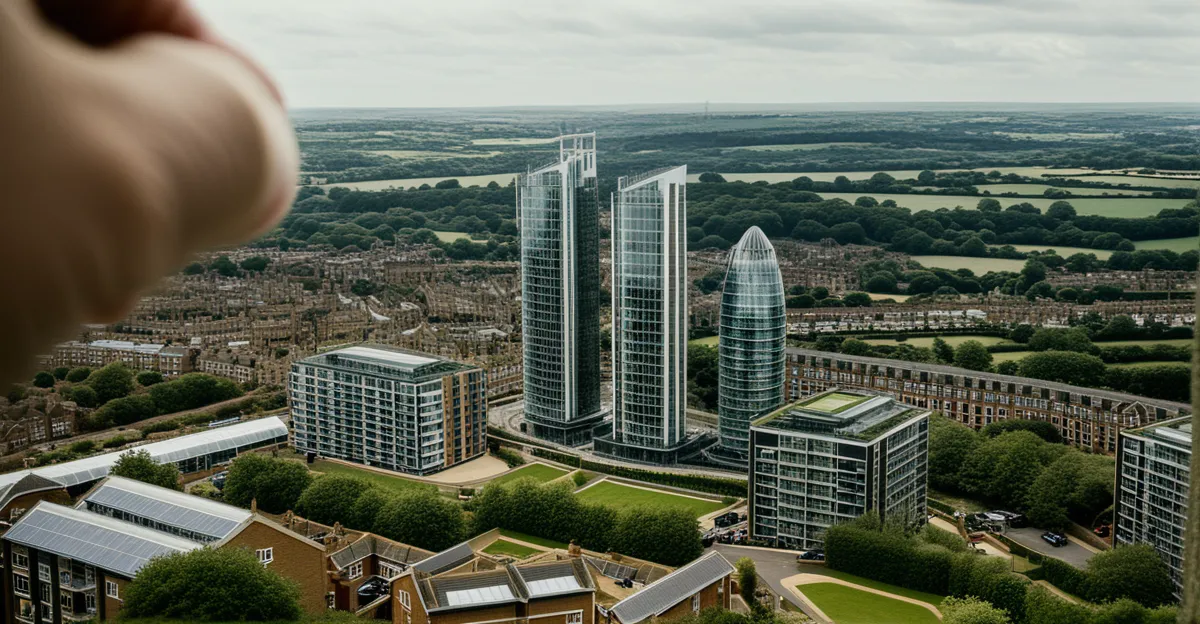The Impact of UK Real Estate Investment on Economic Growth
The UK real estate investment sector significantly contributes to the nation’s economic growth through various channels. Primarily, investments in the UK property market add directly to the UK GDP by stimulating construction activities and property transactions. This injection of capital leads to increased demand for materials, services, and labour, which in turn propels related industries, boosting overall productivity.
Beyond direct financial inflows, the property market catalyses business development. Offices, retail spaces, and industrial properties created through real estate investment enable firms to expand operations, improve efficiency, and access new markets. This fosters a more dynamic and competitive business environment, essential for sustained economic progress.
This might interest you : What role does green financing play in the UK’s real estate sector?
During economic cycles, UK real estate investment plays a stabilizing role. In downturns, the sector’s focus on long-term projects helps maintain employment and output, cushioning the economy. Conversely, in recoveries, renewed activity in property markets accelerates broader economic revival. Thus, the real estate sector acts not only as a growth engine but also as a buffer against volatile economic shifts, underscoring its pivotal role in the UK’s economic landscape.
The Impact of UK Real Estate Investment on Economic Growth
Understanding how UK real estate investment directly shapes economic growth requires examining its role in GDP contribution. Real estate investments bolster the UK economy by generating significant capital inflows, stimulating development projects, and enhancing infrastructure quality. This activity not only raises GDP figures but also fuels productivity by providing modern commercial spaces that improve business efficiency.
Also to read : How Can Real Estate Investments Benefit from the Recent Changes in UK Finance Regulations?
Moreover, the UK property market acts as a stabilizing force during economic cycles. During downturns, sustained investment can cushion negative impacts by maintaining employment and construction activity. Conversely, in recovery phases, property investment accelerates economic rebound by increasing demand for materials and services.
Beyond direct financial injection, real estate investments stimulate growth indirectly. Business expansions often correlate with the availability of quality real estate. New developments in commercial and residential markets attract firms and residents, promoting economic agglomeration. This often leads to higher economic output and innovation.
In short, the economic growth tied to UK real estate investment is multifaceted. It encompasses GDP impact, productivity gains, and resilience across market cycles. Each element supports the dynamic contribution of the UK property market to the broader economy.
Real Estate Investment and Job Creation in the UK
UK real estate investment drives significant property sector employment, notably in construction jobs, property management, and related fields. When investments funnel into large-scale developments, they create demand for skilled and unskilled labour, expanding job opportunities. For example, construction jobs surge during new residential or commercial projects, directly boosting the labour market participation.
Moreover, this job creation isn’t static. Investments often lead to the upskilling of workers, as evolving demands require new skills in sustainable building practices, digital property management, and complex project coordination. This shift elevates workforce quality and adaptability, benefiting the overall economy.
Another vital aspect is the ripple effect through supply chains. Increased construction activities stimulate sectors like manufacturing, logistics, and professional services, multiplying employment beyond core property roles.
Case studies of major UK developments illustrate these trends clearly. For example, regeneration projects in cities such as Manchester and Birmingham have generated thousands of construction jobs over several years, alongside long-term employment in property services.
Thus, UK real estate investment not only expands direct employment but also fosters a dynamic labour market with evolving skill requirements, underpinning economic growth and resilience.
Real Estate Investment and Job Creation in the UK
Real estate investment is a vital driver of property sector employment in the UK, generating extensive jobs in construction, property management, and ancillary services. The surge in development projects necessitates construction jobs, from skilled trades to project management, thus significantly bolstering the labour market.
The demand created by UK real estate investment also fosters upskilling. New technologies and sustainable building practices encourage workers to enhance their capabilities, shifting labour requirements towards more specialized roles. This dynamic adapts the workforce to evolving industry standards and increases overall productivity.
For example, major urban developments often lead to prolonged employment growth, supporting thousands of jobs during and after construction. These projects not only provide immediate work but also support sectors such as facility management and real estate services, creating a broad employment ecosystem.
In sum, UK real estate investment plays a crucial role in stimulating job creation across multiple segments of the labour market. This influence extends beyond mere numbers, fostering workforce development and stabilizing employment levels through economic fluctuations. The sector’s labour demand continually adapts, reflecting wider industry trends and contributing to economic resilience.
The Impact of UK Real Estate Investment on Economic Growth
UK real estate investment directly boosts the UK GDP by injecting capital into construction and property transactions, driving value creation across the economy. When new developments are underway, the demand for materials and labour surges, stimulating broader sectors beyond just construction. This ripple effect enhances productivity and economic activity.
How does UK real estate contribute to business development? Quality and modern commercial spaces provided by real estate investments enable companies to expand operations and improve efficiency. For example, new office parks or retail centres attract firms seeking to grow, which in turn generates economic output and employment. The UK property market thus acts as an enabler of business dynamism and innovation.
What role does real estate play during economic fluctuations? During downturns, sustained investments in property help stabilise the UK economy by maintaining jobs and ongoing projects. Conversely, in recovery phases, increased demand for land and buildings accelerates economic growth by triggering additional spending and confidence. This cyclical buffering effect highlights UK real estate investment as a cornerstone of resilient economic growth.
Housing Market Dynamics and Affordability
Examining the UK housing market, UK real estate investment plays a pivotal role in shaping property prices and housing supply. Increased investment often boosts housing supply through new developments, directly addressing demand. However, the balance between supply and demand remains delicate, with strong investment sometimes driving prices upward due to increased market activity and competition.
How does investment affect property prices specifically? Higher demand linked to investment can escalate prices, impacting affordability. This makes it challenging for many first-time buyers to enter the market. Rental markets similarly respond, as limited affordable housing supply pushes rents higher, affecting renters nationwide.
What about housing affordability? While increased supply from real estate investment can ease pressure in the long term, short-term mismatches cause price surges. Strategic investments focusing on affordable housing projects are vital to improve access to homeownership and rental options.
In summary, the complex dynamics of the UK housing market hinge on how real estate investments influence both supply and demand, with direct consequences for property prices and affordability. Careful planning is essential to ensure investments meet diverse housing needs without exacerbating affordability challenges.
The Impact of UK Real Estate Investment on Economic Growth
UK real estate investment directly fuels economic growth by significantly adding to the UK GDP through construction activity and property transactions. This capital injection stimulates demand for raw materials, labour, and associated services, triggering a multiplier effect across the broader economy. By increasing output in these interconnected sectors, the UK property market acts as a key growth catalyst.
How does this investment impact business development and productivity? Access to modern, well-located commercial properties enhances firms’ ability to expand and innovate. Companies benefit from improved operational efficiency and greater market reach, supported by infrastructure enabled by real estate investments. This environment promotes competitiveness and contributes to sustained economic advancement.
What role does UK real estate play during economic cycles? It acts as a stabilizer when economic activity slows, maintaining employment and ongoing projects which cushions downturns. Conversely, during recoveries, rising demand for property accelerates economic revival by increasing construction and related activities, boosting confidence and spending. This cyclical support underscores the UK real estate investment sector as pivotal to resilient long-term economic growth.
The Impact of UK Real Estate Investment on Economic Growth
UK real estate investment contributes directly to economic growth by injecting capital into the economy, notably increasing the UK GDP through construction and property transactions. When developments proceed, demand for materials and labour rises, stimulating related industries and enhancing overall productivity. This capital flow strengthens the UK property market, fostering a cycle of investment and development that supports sustained growth.
How does real estate aid business development? The availability of modern commercial spaces from UK real estate investment enables companies to expand operations and improve efficiency, thereby raising economic output. Businesses benefit from enhanced infrastructure, which attracts new firms and encourages innovation, driving growth beyond simple property gains.
During economic cycles, real estate acts as both buffer and accelerator. In downturns, ongoing investments help maintain economic growth by preserving jobs and project continuity. Conversely, in recovery phases, increased property market activity boosts confidence and spending, accelerating the economic rebound. Overall, UK real estate investment plays a crucial role in underpinning a resilient and dynamic UK property market that fuels the broader economy.
The Impact of UK Real Estate Investment on Economic Growth
UK real estate investment directly contributes to economic growth by increasing the UK GDP through capital inflows into construction and property transactions. This investment drives demand not only for materials and labour but also for services supporting these activities. As a result, the UK property market stimulates broader economic activity by generating significant multiplier effects beyond the immediate real estate sector.
How does this influence business development and productivity? Access to modern and efficient commercial spaces created through real estate investment allows companies to expand operations, enhance workflow, and enter new markets. This growth in business capacity fosters increased productivity, which is a core component of sustained economic growth.
What role does the property market play during economic fluctuations? Real estate investment stabilizes the economy during downturns by maintaining employment and ongoing construction projects, reducing negative shocks. In recovery periods, increased investment accelerates economic revival by boosting demand for development and related industries within the UK property market. This cyclical role highlights the importance of real estate in sustaining resilient long-term economic growth.










